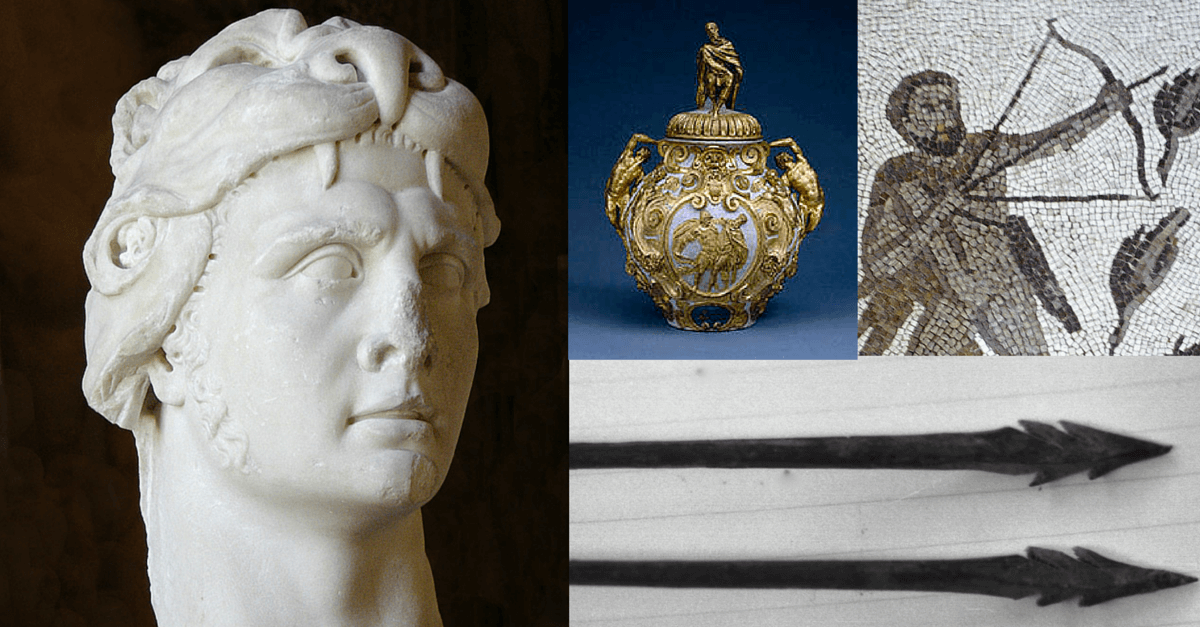Poison had a steady but often quiet or controversial place in the history of warfare. On one hand, it was incredibly useful. Poisoned wells could cause havoc for a thirsty army, poisoned arrows could cause wounds that festered and lead to excruciating pain for weeks, putting a strain on an army’s medical staff and fear among the common soldiers.
On the other hand, poisoning was seen as uncivilized and exhausting. Poison had to be harvested and its delivery wasn’t always guaranteed. Even when it was used, writers often overlooked it as it was occasionally seen as dishonorable, depending on the specific time period or culture. For example, the Greek hero Hercules openly used arrows coated in deadly Hydra venom, but the Romans seeking vengeance against Arminius did so with armies, not with any aims at poison assassination.
If there was any one figure who wholeheartedly embraced and feared the mighty potential of poisons, it was King Mithridates of Pontus. Pontus was a small kingdom on the south shore of the Black Sea. Not quite Hellenic, but not wholly Eastern, the young King Mithridates decided to lean into the Hellenic side and forge himself an empire.
From a very young age, Mithridates was fascinated with poison. When he ascended to the throne he imprisoned and quite possibly poisoned his mother and brother. Understandably, Mithridates was considerably concerned with being poisoned himself. He learned everything he could about poison through thorough reading and experimentation. More than just a bookworm and alchemist, Mithridates was also exceptionally fit. He often practiced sword fighting and was a talented rider. In a period where generals were increasingly standing back to observe the battle, Mithridates seems to have joined the fray quite often.
Indian generals and kings often employed poison and wrote extensively on types and their possible antidotes. They had a particular emphasis on snake venom and poisoned arrows, not with the most rapidly lethal dose, but the most drawn out and painful one. Mithridates often experimented with the effects of poisons and antidotes on people. He did this on criminals already condemned to death in an attempt at being ethical.
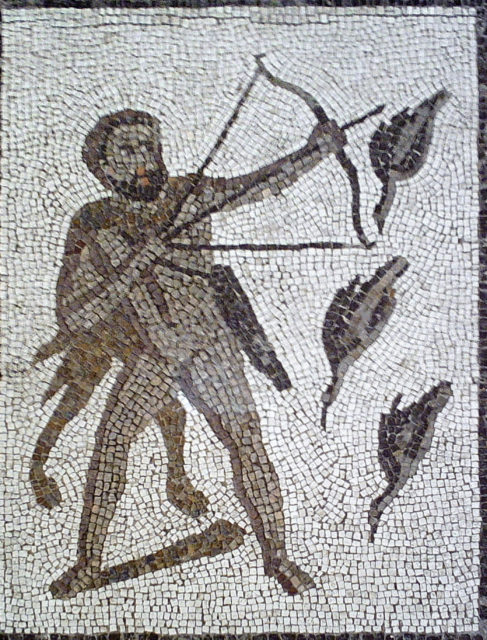
From here, Mithridates began taking small doses of a variety of different poisons in order to make himself immune. He also prepared a perfectly crafted antidote, built from a variety of plants and other materials including cinnamon, garlic, charcoal, ginger, parsley, opium and duck blood, among dozens of other secret ingredients. Mithridates combined both antidotes and poisons into custom made pills, possibly bonded by special poisoned honey. The pills boosted Mithridates’ immunity while possibly protecting him from assassination attempts.
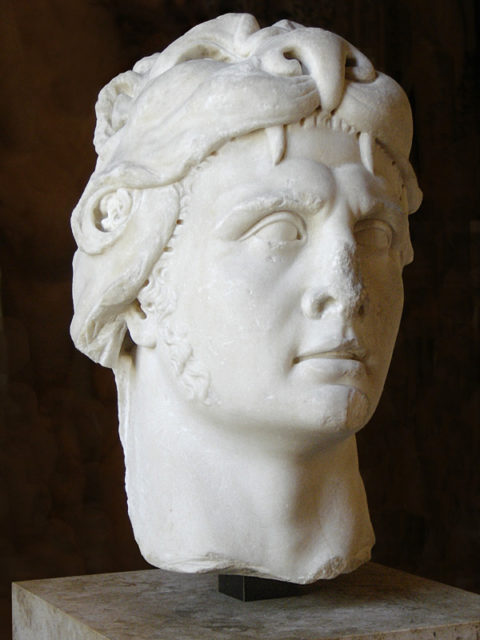
Aside from personal life, Mithridates set his sights on a Black Sea-Empire. He gained himself a solid ally in Armenia to the east and struck out at the Crimean Peninsula. As he worked up the coast, Mithridates encountered the inhabitants of Colchis in modern Georgia. While taking the area he faced tribes who threw beehives and cities that launched out rotting corpses. The fighting was harsh, but Mithridates prevailed and learned a lot about fighting dirty.
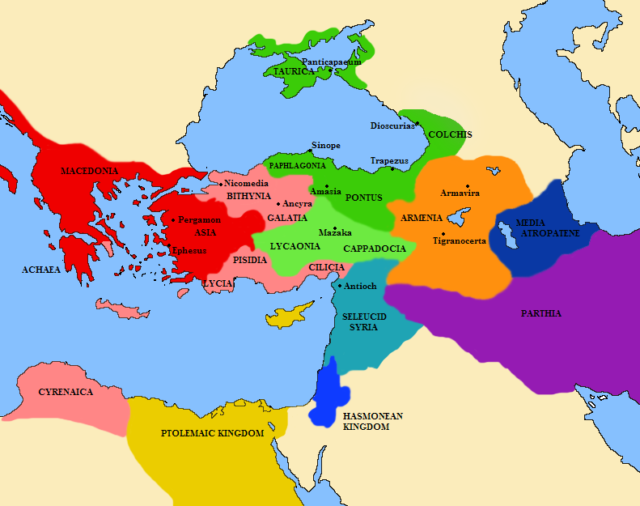
Eventually, Rome and Mithridates clashed over control of Greece. Greece had been under Roman control, but Mithridates declaration for Hellenism won the Greeks over so much that they pledged their loyalty for Mithridates. Between Greece and Pontus lay Bithynia, a pawn of Rome. After a brief Bithynian-Pontic War, things died down in western Turkey, but not for long.
A deep resentment of Romans was present in Turkey (Anatolia) and Mithridates capitalized on this by organizing one of the largest mass executions/genocides on antiquity. Messages were sent out to all of the major cities in eastern Anatolia to organize a mass killing of all Romans on the same day. Resent of the Romans ran through all social classes and so most everyone participated on the day of the killings. Over 100,000 Romans were killed that day of 88 BCE, prompting a full Mithridatic War.
The first Mithridatic War went all Rome’s way. Led by Sulla, Rome largely reconquered Greece, nearly obliterating Pontus-allied Athens as a message. Sulla was the main general of the campaigns. He was prepared to invade Anatolia until unrest erupted in Rome. Sulla concluded a quick peace with Mithridates to return to rule Rome.
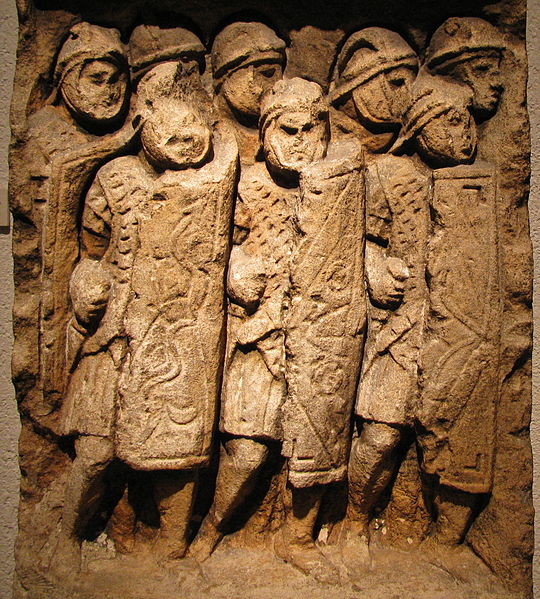
The second war was a disaster for Rome as a Roman policing force in Anatolia decided to attack Pontus. The brief war saw several victories for Mithridates before another hasty peace, this time, more beneficial for Mithridates.
The third war was the longest and hardest fought of all three. Roman armies won several victories against Mithridates, but they were so hard fought that Roman armies oftener threatened to mutiny. These battles were so hard fought because Mithridates built dozens of new fortresses throughout his territory and had his armies and allies use poison and other unorthodox means to fend off the Romans. In one siege at Amisus, Roman commander Lucullus tunneled under the walls. Subterranean caverns allowed for a few large skirmishes, but soon the Roman diggers were routed when the defenders threw dozens of beehives into the tunnels.
Other terror tactics were embraced by Mithridates during the war. A captured Roman officer was executed by having molten gold poured down his throat. Mithridates was also one of the last commanders to have success with Scythed chariots. In some battles, particularly in the second war, the chariots were able to burst through Roman ranks, causing devastating carnage as the bladed wheels spun with enough force to cut through armor and limbs.
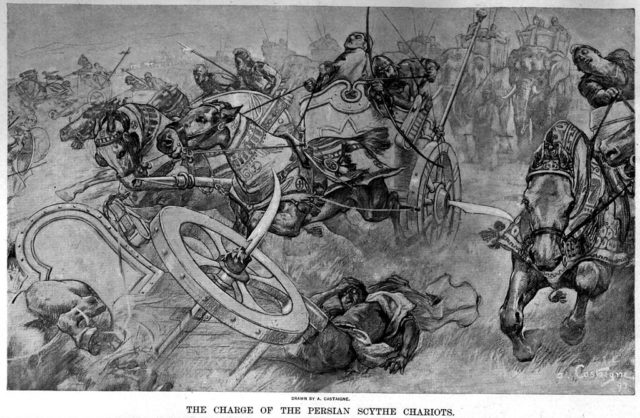
When Lucullus decided to swing east and ravage Pontic-allied Armenia, he faced another siege. This time, the city, Tigranocerta, held the Armenian King as well as Mithridates. The prospect of taking two enemy Kings spurred the Romans on, just as the defense of two kings prompted a creative defense by the defenders. This was one of the first instances where Romans faced the mystical firebombs that were the petroleum-based naphtha.
The naphtha caused terrible damage and horrible burns throughout the legionaries. Despite the fiery onslaught, the Romans took the city but Mithridates and his ally were able to escape. In successive battles, the Romans faced barrages of poisoned arrows. The poisoned arrows were likely employed throughout the wars but mostly discussed here.
Mithridates likely employed poison arrows in large numbers in his desperation to win the war. He was also in Armenia and modern Georgia where an abundance of poisons naturally exists. Regardless, the poison arrows were devastating to Lucullus and his legions. The campaign was now a pursuit, with scattered battles. The arrows were designed with an extra point to break off at the tip when they were removed. This left the poison and painful metal deep inside the wounds. The poison was usually fatal but caused days of agony before death. Arrows could also be poisoned with snake venom, plants and other means, making wounds difficult to diagnose and treat.
The uptick of poison arrows finally caused massive unrest in the ranks. The suffering of the poisoned men was terrifying to behold, especially when mixed with the horribly disfigured skin of the victims burned by the sticky Naphtha fire. To pile on to the misery, blizzards through the pursuit left a few men with frostbite. With all this misery, it was decided to replace Lucullus with the famous Pompey.
Pompey aggressively pursued Mithridates into the poison haven of Colchis (modern Georgia). Mithridates was desperate after a string of defeats, but still defiant. He finally lost the support of his Armenian ally, forcing him into the Caucus mountains. Here he left out some special honey produced from the poisonous rhododendron plant. The Romans were overjoyed by this fine and consumed great amounts of this honey. The effect was quite interesting; an odd tingling led to vivid hallucinations, something that people of the region still use the honey for today. Too much of the honey caused vomiting, diarrhea, seizures and low blood pressure that could be fatal.

This actually caused very few casualties, but so many of Pompey’s soldiers were so high that they were useless for days. During this Roman stupor, the Romans were attacked by some of the vicious tribes of the area, resulting in thousands of casualties. had the Romans had their wits about them, such loose tribal attacks would have been easily repulsed.
Despite the honey trap, Mithridates still needed to retreat, this time over the Caucus Mountains. He sought the help of his son in Crimea, as Pompey was able to essentially annex Pontus under another son of Mithridates. Seeing that the war was going terribly for his father, Machares rebuffed his father and pledged the allegiance of Crimea to the Romans.

Mithridates now had nowhere to turn, so he went to Crimea anyway. Here, Machares either panicked at the approach of his father and committed suicide, or Mithridates lured his son into a sense of safety before having him killed. With this Mithridates had Crimea, but now his son in Pontus was raising an army of Mithridates’ former subjects to hunt down his father.
With Pompey approaching, one son dead, and one actively opposing him, Mithridates resolved to commit suicide along with his daughters. According to legend, Mithridates took a supposedly lethal dose of poison that he always carried with him but this failed because of Mithridates’ paranoid lifelong habit of building up his immunity. This was quite the embarrassing story that was happily spread around Rome, but the truth could be more easily explained.
Author Adrienne Mayor, the investigator of a large majority of poison use in the ancient world, supposes that Mithridates shared his single lethal dose with his daughters first, and attempting to take his life with only the remaining third. Regardless, Mithridates was weakened, but not killed by the poison, and lacked the strength to stab himself with his sword. He begged his bodyguard to do it for him to spare Mithridates from being led as a captive through the streets of Rome. His bodyguard was able to do the deed and ended the life of one of the most elusive and infuriating enemies that Rome had ever faced.
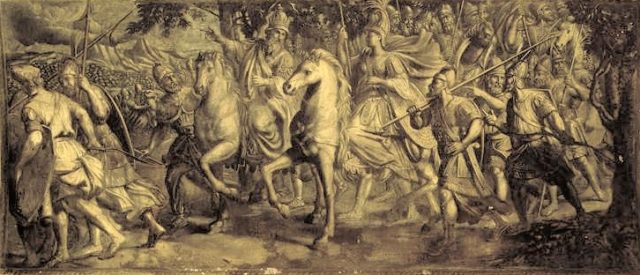
The Mithridatic Wars lasted over twenty years and saw the massacre of thousands of Romans. They were killed unexpectedly in the streets to kick off the wars, pelted with beehives and burning petroleum, and poisoned by honey. On top of it all, they terribly feared even a scratch from a poisoned arrow.
Mithridates had grand goals of a Black Sea Empire to go along with fears of family deception and poisoning. He dared to stand against the Romans, and he succeeded in obtaining a rather large and incredibly wealthy empire despite the long wars with Rome.
The Roman war machine was too well practiced for Mithridates to stand against, however, and he spent much of his time recovering from defeats and planning new ways to poison or otherwise aggravate the Romans. PTSD is not often discussed in the ancient world, but if war ever scarred the soul of Romans, it would have been those who served on the campaigns against Mithridates the Great.
